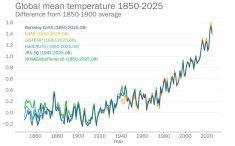NEW YORK, June 11 (Reuters) – The U.S. Weather Service warned on Thursday the El Nino weather pattern that can cause droughts in Asia and heavy rain in the Americas will likely last into next year, longer than previously expected and potentially roiling crops and commodity prices.
The Climate Prediction Center (CPC), an agency of the National Weather Service, pegged the chances of El Nino weather conditions continuing into the Northern Hemisphere’s 2015-16 winter at 85 percent, becoming the first major forecaster to say the event is highly likely to last into next year.
Read Also

B.C. ostriches now to be culled after ruling: CFIA
Birds are now to be culled from a British Columbia ostrich operation that sought to bypass standard federal practice in on-farm outbreaks of highly pathogenic avian influenza and has been denied an appeal at Canada’s highest court.
CPC previously saw a more than 80 percent chance El Nino would last through 2015.
Government forecasters have been heightening their warning calls for a stronger and longer El Nino. Japan’s weather bureau on Wednesday also said it sees the possibility of El Nino lasting into the winter.
The event, the warming of Pacific sea-surface temperatures, can have devastating consequences for global agriculture, triggering heavy rains and floods in South America and scorching weather in Asia and as far away as east Africa.
In the United States, El Nino increases precipitation in key agricultural regions and reduces the likelihood of a busy hurricane season from June to November that can disrupt energy operations in the Gulf of Mexico.
“Across the contiguous United States, temperature and precipitation impacts associated with El Nino are expected to remain minimal during the Northern Hemisphere summer and increase into the late fall and winter,” CPC said.














